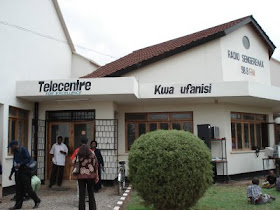
Sengerema Tele-Centre, the biggest in East and Central Africa. It is located in Sengerema district in Mwanza region. The centre was established by help of IICD since 2001 and has been providing ICT services to the people of lake zone region.
About half of the 2000 government-registered secondary schools in Tanzania are in rural areas with feeble communication infrastructure. There was a need for a paradigm shift in the provision of ICT services and especially so, connectivity in rural areas. ICT stakeholders who focuses on rural area need to develop connectivity models that are people centered and relevant to those communities. The government’s commitment to the establishment of rural Tele-centres is one of the ways and part of the government’s effort to help the rural poor and other underserved segments of the population to have access to ICT. By so doing the government aimed at empowering them to meaningfully participate in the current era of globalization and knowledge-based economy, in spite of the fact that, high costs of rural connectivity. This has become a synonymous challenge as costs of internet connectivity and bandwidth which has been an impediment to the progress of many ICT projects in rural areas in developing world. The best option to reduce cost burden is for users to share connection technologies whenever possible. A model if sharing connectivity from rural community centres is an option. As far as the Tanzanian ICT education is concerned, the project managers can pick a vivid practical experiences from normal operation of Tele-centers in rural areas of Tanzania. Rural Tele-centers of Sengerema in Mwanza, Dakawa in Morogoro, Ngara Lokole in Kagera, Kasulu in Kigoma and Lunga-Lugoba in Coast region as learning examples in Tanzania.

A SWOPnet trainer in a training session in Mwanza region. IICD has been sponsoring such training in collaboration of SWOPnet (Share With Other People Network), an organization based in Mwanza city in northern Tanzania. SWOPnet trainings helps to empower individual groups, civil organizations and government institutions in various aspects of ICT knowledge. (Photo by the courtesy of SWOPMET website)
Development partners kike the IICD have contributed in the establishment of these Tele-centers and that Tanzania is among 20 African countries set to gain from the community Tele-centre project of the International Telecommunication Union (ITU). Currently the Tanzania Telecommunication Company (TTCL) operates a national wide internet backbone covering 21 regional administrative headquarters of Tanzania mainland and some administrative district centers. TTCL is also rolling out CDMA technology and many other data operators are also extending their VSAT connectivity services and cost effective solutions to remote district. ICT project cannot be stalled due to feeble or total lack of cost effective rural connectivity in Tanzania.

No comments:
Post a Comment